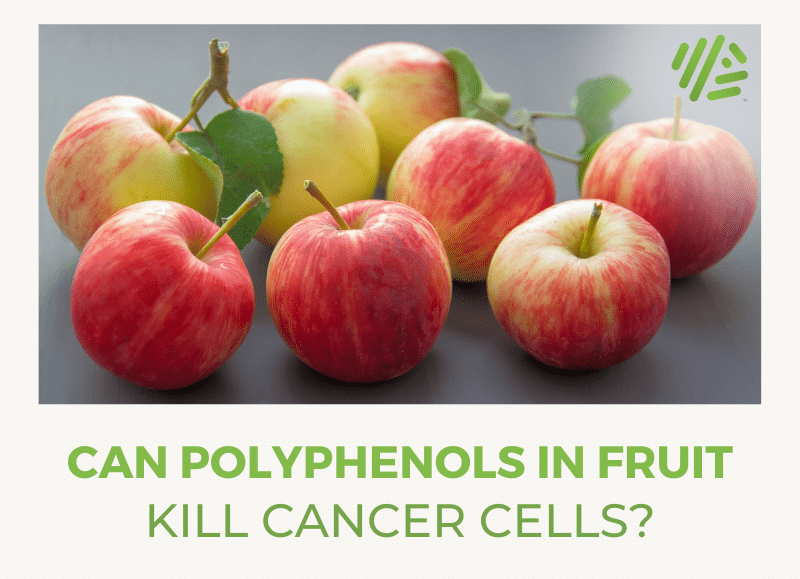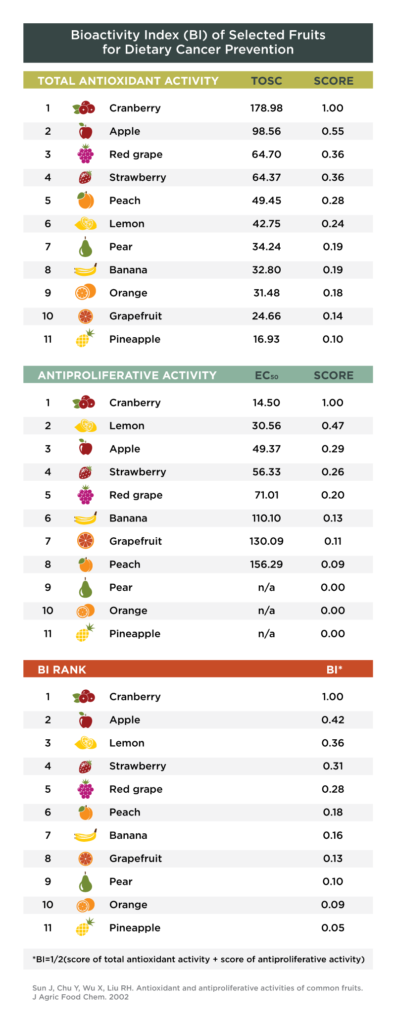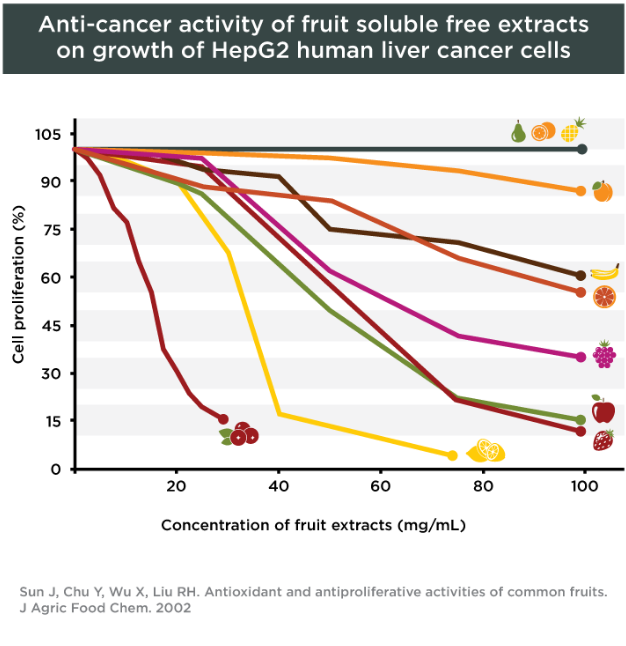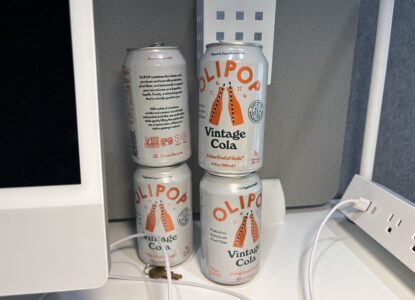Can Polyphenols in Fruit Kill Cancer Cells?
Article at a Glance
- Population studies show a correlation between increased fruit and vegetable intake and a reduced risk for cancer.
- Polyphenols, antioxidants found in plants, modulate a variety of cellular signaling pathways, influencing the initiation, promotion, and progression of cancer. Specifically, polyphenols seem to induce cancer cells to, essentially, commit suicide, in a process called apoptosis.
- Apoptosis is one of the body’s natural ways to get rid of damaged and diseased cells, including cancer cells.
- A Cornell study found that of the eleven most commonly consumed fruits, cranberries have the highest level of polyphenol bioavailability, followed by apples. Both fruits inhibited the growth of liver cancer cells in vitro (in a petri dish).

Contents
- Modern farming has reduced polyphenol count
- Types of polyphenols and where to find polyphenols in food
- How polyphenols may protect against cancer
- Three factors for apoptosis (technical)
- Bioavailability of polyphenols
- Impact of different fruits on cancer
- The takeaway – polyphenols and cancer
- What about Gerson Therapy?
Polyphenols are a group of more than 10,000 compounds found in plants that appear to have antioxidant, anti-cancer, heart health, and anti-inflammatory activity.
Not surprisingly, then, one of the questions researchers are currently investigating is whether polyphenols in fruit kill cancer cells. The studies, which have been conducted in test tubes, aren’t intended as cancer therapy, but rather as a means of exploring how dietary decisions can affect human health over the long term.
In this post I focus more on the specific anti-cancer properties of polyphenols in general.
Thanks to evidence from multiple epidemiological studies, there’s no question that a diet rich in fruits and vegetables helps to protect against various types of cancer. As such, scientists have recently begun to hone in on how exactly a predominantly plant-based diet reduces your risk of cancer.
And, lo and behold, polyphenols are a prime focus of study.
Modern farming has reduced polyphenol count
Although they can benefit human health, many are surprised to learn that polyphenols are part of the natural defenses of plants. Plants (and some microorganisms) produce phenols in response to ecological pressures. These include pathogens and attacks by insects, ultraviolet radiation, and injury. There is some conjecture that the rampant use of pesticides and herbicides in agriculture has diminished polyphenol concentrations in plants. Use of these external methods to eradicate pests, means plants no longer need to produce the same levels of polyphenols to protect themselves.
One way to increase the polyphenol content of your diet may, therefore, be to eat more organic produce grown without the use of pesticides.
Types of polyphenols and where to find polyphenols in food
Polyphenols can be divided in to groups according to their chemical structure.
There are four main groups of polyphenols: phenolic acids, flavonoids, polyphenolic amides, and miscellaneous polyphenols. Some of the best known and most studied polyphenols include:
- Tannic acid (a phenolic acid)
- Isoflavones – daidzein and genistein (flavonoids)
- Flavonols – rutin and quercetin (flavonoids)
- Flavanones – naringenin and hesperitin (flavonoids)
- Flavanols – catechin and epigallocatechin gallate (flavonoids)
- Proanthocyanidins – procyanidin B1, B2, A2, and C1, and theaflavin (flavonoids)
- Anthocyanidins – cyanidin and petunidin (flavonoids)
- Polyphenolic amides – capsaicin
- Other polyphenols – resveratrol, curcumin, rosmarinic acid, gingerol, and ellagic acid.
Some of the richest food sources of polyphenols include spices and herbs, cocoa products, nuts and seeds, berries and vegetables. Top of the list are:
- Cloves
- Peppermint (dried)
- Star anise
- Cocoa powder
- Mexican oregano (dried)
- Celery seed
- Black chokeberry
- Dark chocolate
- Flaxseed meal
- Black elderberry.
Olives, artichoke, chestnuts, and hazelnuts are also good sources of polyphenols (R).
How polyphenols may protect against cancer
Polyphenols modulate a variety of cellular signaling pathways, influencing the initiation, promotion, and progression of cancer. Specifically, polyphenols seem to induce cancer cells to, essentially, commit suicide, in a process called apoptosis.
Apoptosis is one of the body’s natural ways to get rid of damaged and diseased cells.
Most types of cytotoxic cancer treatments, such as chemotherapy, work by inducing apoptosis. Where these conventional cancer treatments fail, the blame is increasingly placed on defects in apoptotic programming. One major area of current cancer research focuses, then, on finding ways to enhance the sensitivity of cancer cells to these conventional drugs, so as to induce apoptosis in cancer cells.
And, within that area of research, some scientists are focusing on polyphenols.
Apple polyphenols and colon cancer
Apple-derived polyphenols seem to be especially helpful in this regard. In one study, these polyphenols modulated gene expression to inhibit the growth of human colon cancer cells. The genes in question were GSTP1, GSSTT2, MGST2, CYCP4F3, CHST5, CHST6, and CHST7 (R). Other studies have also found that polyphenols sourced from apples, namely procyanidins, inhibit a signaling mechanism involved in the progression of colorectal cancer, the second most major cause of mortality and morbidity among females and the third among males (R, R).
Tea polyphenols and cancer
It’s not just apples that offer benefits from polyphenols, of course. Tea polyphenols are relatively well studied and have been found to have a range of anticancer properties, including guarding against epigenetic errors that can occur during DNA methylation, histone modifications, and in micro-RNAs (R). One particular polyphenol found in abundance in green tea (epigallocatechin-3-gallate, or EGCG) has been seen to inhibit a signaling pathway involved in colorectal cancer development (R) and to increase the expression of a p53 gene, thereby inhibiting the progression of colorectal adenoma to carcinoma (R).
Three factors for apoptosis (technical)
Three key factors regulate apoptosis. The p53 genes are one factor. The other two factors are caspase signaling proteins and the Bcl family of proteins. Polyphenols in general have been seen to influence these factors to induce apoptosis in cancer cell lines including lung, skin, and prostate cancer cells (R, R, R, R, R). In colon cancer HT-29 cells, flavone polyphenols have been found to increase the production of superoxide radical, leading to apoptosis in the cancer cells (R). Other studies have also found that some polyphenols act as prooxidants, enhancing the production of reactive oxygen species to trigger cancer cell death (R, R, R).
In addition to their anticancer properties, polyphenols may help protect against cardiovascular and neurodegenerative diseases and affect immune function by influencing white blood cell proliferation and the production of cytokines (R).
Bioavailability of polyphenols
Of course, all this talk of polyphenols is redundant if we can’t absorb the compounds from plant foods. Fortunately, a Cornell University study looked at just that, and found that of eleven commonly consumed fruits, cranberries have the highest level of polyphenol bioavailability, followed by apples. This study also looked at the effects of the polyphenols on liver cancer cells. The researchers found that the polyphenols had antiproliferative activity, i.e. they inhibited the growth of new cancer cells.
We have documented the data with two charts that I have included below.
Impact of different fruits on cancer

The takeaway – polyphenols and cancer
This was a deep dive into the science of polyphenols, but what does it mean for treating and preventing cancer? Well, there certainly seems to be support for the prevailing advice to eat a predominantly plant-based diet rich in fruits, vegetables, nuts, seeds, legumes, pulses, and whole grains to reduce your risk of various types of cancer. This type of diet is naturally high in polyphenols. It also provides plenty of fiber, lean protein, and healthy fats, and essential vitamins and minerals. Together, these all help to keep your body healthy and your cells in good working order.
What can’t be recommended from the current state of evidence is the adoption of anything extreme, such as Gerson therapy for cancer.
What about Gerson Therapy?
Gerson therapy is an unproven dietary protocol, characterized by a strict low sodium, high potassium diet based on organic fruit and vegetables. Gerson therapists claim that cancer can be cured by consuming vast amounts of fruit and vegetable matter, along with potassium and vitamin B12 supplements, pancreatic enzymes, and thyroid supplements, and three or four coffee or castor oil enemas every day.
Although films like the Food Cure offer an enticing picture of success for some people, there is scant evidence that Gerson therapy cures cancer. Indeed, while such treatment (at home or in a clinic) may provide temporary solace and comfort to individuals with terminal cancer, this kind of extreme diet can cause harm. Coffee enemas deplete the body of potassium and may cause infections, dehydration, seizures, heart and lung issues, and constipation and colitis. In some people, the effects of this regimen can prove fatal. Other side effects can include diarrhea and vomiting, loss of appetite, abdominal cramps, cold sores, dizziness, weakness, and flu-like symptoms such as aches, fever, and sweats.
As with so many things in nutrition, cautious enthusiasm and moderate consumption may be key for polyphenol intake. Focusing too much on these compounds could decrease dietary variety, and polyphenols aren’t the be all and end all of good health. That said, there’s unlikely to be any harm (and may well have some benefits) in including polyphenol rich foods such as apples, cranberries, cocoa products, herbs, spices, and a refreshing cup of peppermint tea in your everyday diet.





ALl these anti cancer foods have a ton of sugar in them. Black tea, green tea doesnt. Three cups a day will keep any sickness away. Ive always been a big tea drinker. I use to drink with cream and sugar but always got several yearly colds and flu. Gained weight etc. Now for two years ive been drinking my teas black with no cream or sugar. Now I can be around people with colds and I wont get sick. Havent gotten the flu either. Cancer killed 8/10 of my grandmothers siblings. I dont want to die of cancer. I cut out dairy (estrogenic food) from my diet and now the black tea and I feel amazing.
What about blueberries? Raspberries? Blackberries? They are the kings of fruit nutrients!